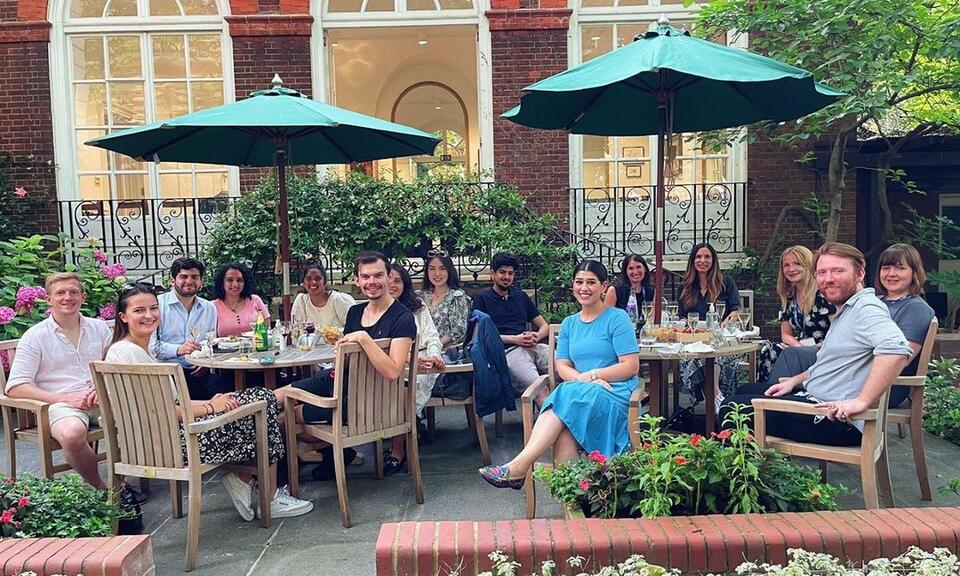
Published
Blog type
I have worked in international higher education for seven years, so when it came to researching my own post-graduate study, I had something of a head start.
So, what was it that lead me to Imperial College Business School’s Weekend MBA programme? How is the programme structured? And, four months in, has it proven to be the right choice so far? I’ll explore these questions in this blog.
Why Imperial?
When considering business schools, it was key for me to consider the right ‘fit’; it is important to remember that the School is not only selecting you as a candidate, you are also selecting the school.
Imperial College is a brand that is known around the world for innovation, science, and technology. I currently work as a Business Analyst delivering technology-enhanced change projects and plan to continue my career in this space. The Imperial brand was a clear fit for not only where I am but also where I intend to go.
Location was a significant factor for me. I live, work, and have family based here in London. While international relocation was an option, London is one of the few cities in the world that is an economic, political, and cultural hub. Pairing my personal situation with this made London study appealing. The potential loss of the benefits of studying abroad was tempered by the many international opportunities the programme offers, from the Global Experience Week to the international electives.
My desire to learn from different experiences, cultures, national backgrounds, and ways of working was also met by the diverse Imperial community, both within the Weekend MBA itself and the wider Business School and university. Taking my own syndicate group as a microcosm, we are six individuals from six different countries working in six different industries; the diversity of thought, perspective, and experience is invaluable.
The Imperial Weekend MBA format: studying part-time in London
What particularly sets the Weekend MBA programme apart from the traditional MBA pathway is the format. For one weekend a month, my classmates and I come together from our different locations to learn with and from one another on campus at Imperial. Outside of these structured times, we use the power of technology to remain in contact and support each other on our MBA journey.
The weekend format works for me in particular as it allows me to apply the learning from the classroom to my work in real time, and then to bring those learnings back into the classroom to further enrich the experience.
Within four months of starting the programme, I have already applied skills gained from Decision Analytics to enhance prioritisation processes at my workplace, used Organisational Behaviour theories to improve the way I engage with stakeholders, and utilised Management Accounting to better understand my organisation.
Combining full-time work with studying
The Weekend MBA format also allows me to continue to progress with my career as I earn my MBA. For some, the immersion of a full-time programme suits their individual approach, giving them space and time to pause and reflect. For me personally, I am keen to maintain professional momentum, a feeling I know is shared by others in my cohort who even at this early stage in the programme have grasped new professional opportunities.
For people considering the Weekend MBA programme, however, the format certainly does not make it a ‘soft’ option compared to a full-time programme. The core and elective learnings of a world-leading MBA programme remain the same; the commitment should not be underestimated.
Outside of the structured on campus weekend teaching, I spend between 15-25 hours of my week studying in addition to maintaining my full-time job. But I can fit those hours around my other commitments – personal and professional – with an element of flexibility less available had I taken the full-time studying route.
Beyond my MBA graduation…
So, how does the Weekend MBA programme and Imperial College Business School link to my future career goals beyond graduation?
The programme attracts individuals who already have notable professional experience behind them. Indeed, learning from such individuals is almost as valuable to me as learning from the excellent faculty. As a result, my Weekend MBA classmates and I are not at the point in our careers where the ‘traditional’ MBA internship route is not necessarily appropriate.
I intend to leverage my learnings, new networks, and professional experience gained prior to and during the programme to transition to the consulting and/or digital transformation space as an experienced professional. I hope that the Business School’s electives on Business Problem Solving, Digital Transformation, and Project Management will build on the fundamental learnings of the core modules to help me execute this.
This said, as I discussed with my personal Careers Consultant from the well-equipped Careers team at the Business School, I remain open to the new possibilities and avenues the Weekend MBA experience may reveal to me. From my professional experience working in higher education, I know these programmes are transformative, and I look forward to what I continue to learn about business, innovation, and myself over the months and years ahead.
